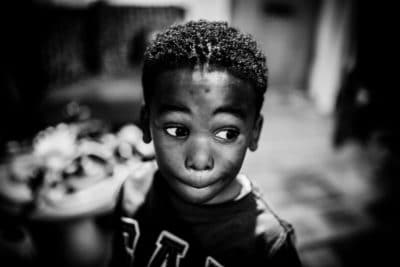
We have a problem.
A continuing, lingering, painful problem.
Black moms and dads and grandparents throughout this country are looking at the sweet faces of their black boys with fear in their hearts. Today, black moms and dads and grandparents are looking at the black boys entrusted to their care and wondering how others will perceive their boys. Trayvon Martin, they know, is dead. So is Jordan Davis, another black teen who was shot by a white man who has not been found guilty of murder. Will their sons and grandsons be next?
Whether or not you believe George Zimmerman and Michael Dunn were within their rights when they shot Trayvon Martin and Jordan Davis, we have a problem. We live in a place and time when parents of black boys cannot be sure of their sons’ safety. We live in a place and time where parents of black boys feel obligated to give their sons very, very specific instructions in case the boys are ever stopped by cops. We live in a place and time — in the 21st century! — when some parents of black boys pressure their sons to be the BEST — not good enough, but the BEST — because they know that “good enough” won’t get a black male far in this society.
We have a problem. A big problem.
As a white mother of 4 white boys, I’ve said little about racism. I don’t know what it’s like to be black in America. I don’t fully understand the challenges of raising a black boy. But I know this: I have never, ever looked at any of my boys and wondered if he might someday be randomly gunned down by a stranger making assumptions based on the color of my son’s skin. I have never, ever felt the need to pressure my sons toward academic achievement in order to overcome other people’s perceptions of their abilities. I have always had the luxury of assuming my sons’ safety, of assuming that my sons will be judged by the content of their character rather than the color of their skin.
That is not true for parents of black boys, even today.
We need to worry about black boys, not because black boys are a threat but because black boys are threatened. Black boys are growing up in a society that still reflexively assumes the worst. In a society that wants to ignore institutional racism, yet jails and disciplines young black men at a disproportional rate.
During the first week of February 2014, I watched American Promise, a documentary that follows two families’ attempts to get top-notch educations for their sons. The boys are black. The families are well-to-do and well-spoken. The boys’ paths through school, though, are anything but easy.
Are the boys’ challenges because they are black? Because they are boys? Because they are black boys? It’s impossible to know, with any certainty, what lies behind the issues faced by the boys and their families, and it’s entirely possible that every issue they faced was multi-factorial. Life is rarely simple; it is almost always complex.
One thing that stood out to me (and many other viewers) was the amount of pressure one family seemed to be placing on their son. The pressure was relentless. The boy — a good, well-meaning boy — was trying. But even when he was tired, there was homework to do. And when he was applying to colleges, a college acceptance wasn’t good enough. His parents wanted him to apply and be accepted to the right college.
As a mom, I’ve always been kind of laid back about school achievement. Don’t get me wrong: I think education is extremely important. Learning can happen in all kinds of places, though, and I don’t personally believe that school grades are the best indicator of personal achievement or potential.
So I found myself wishing that the parents in the movie would stop pressuring their son. I wondered what the boy would do if he could do what he wanted. And then I realized: It may not be so simple.
Since we were chatting about the movie, real-time, on Twitter, I posed a question:
Parents of black #boys, do you really feel so much pressure to push your boys to do well? #AmericanPromise
— BuildingBoys (@BuildingBoys) February 4, 2014
The answer I received was instantaneous: YES.
And I realized, for the very first time, the luxury of freedom from assumptions. I have never pushed my boys to do well because I’ve never been concerned with how other people will perceive them. Because my boys’ skin is white, I’ve always been comfortable in my assumption that people will accept my boys for who and what they are.
Mind you: I never realized that my confidence in that conviction had anything to do with skin color. I never thought about my boys or their future in terms of skin color at all. And that, right there, is white privilege. I’ve never pondered the relationship between my boys’ futures and their skin color because I don’t have to. Were they black — you bet I’d be worrying.
If I knew that my son, every single day, faced people who would assume he was dumb or dealing drugs or running with a gang… you bet I’d be on him, hard, about his behavior. If I knew that my son, in his future, would likely have to prove to someone that he was exceptionally qualified just to get a seat at the metaphoric table, you bet I’d stress the importance of school and grades and the right college. And if I knew that my son was more likely than other boys to land in jail or prison for a minor offense, you bet I’d tell my boys to be extra polite to police officers.
That’s a lot of pressure. And it’s not right. Black boys should not face additional obstacles due to the color of their skin. But they do, and that’s why we need to worry about black boys.
We all need to pay attention to the issues affecting our black boys, and we need to work together to ensure that ALL BOYS have an equal shot at life.







5 Responses
Thanks for your thoughtful post. I think more of us need to speak out on this issue – more of us who are not black but who are feeling empathy and some understanding of the issue. Maybe it will take us speaking out to help eradicate the stereotype. Yesterday, on Facebook, I proposed starting a blog or a Facebook page where we profile wonderful black boys who are working hard and doing their best – and not just boys who are dressed the way some white people would like them to dress or listening to the kind of music some white people would like them to listen to. Maybe, as a white woman, it’s presumptuous of me to propose such a thing. Like you, I don’t pretend to know what it’s like to be a parent of a black son, but I know some of these boys and worry about them, too. And I also worry about the boys I don’t know, and I can’t sit still and be quiet about it. Of course, it’s also important to remember that it isn’t just boys. Remember that girl who was killed when she tried to get help? The racial stereotypes are damaging to all of us. That video of the white guy trying to break into a car while everyone ignored him (including the cop car that whizzed right by), while the black guy doing the same thing evoked an immediate 911 call? How does that help any of us? The white guy just gets a pass? We assume the white guy has good intentions and owns the car? How often have people been put in harm’s way because of that kind of thinking?
I love your idea of featuring profiles of boys! In fact, I’ve been thinking of doing just that here on Building Boys. Know a great boy we should profile me? Email me: je******@je************.com.
This is a very thoughtful post. I believe black boys and boys of color for that matter never get to experience childhood in a complete way, in a whole way because of the things black mothers have to ensure that they know. Childhood, boyhood is something that is reserved for white children. There is very little time for black boys to be just boys.
Hi Jennifer,
“With liberty and justice for all!” does our Pledge of allegiance seem to promise us, or at the very least boast of. Equality for all is certainly a great goal but it is not a reality in America. At least, not as far as I can tell. As a white man I have been the target of racial physical violence simply because I was the friend of a black man. The offense “Get him too, he’s a n—–r lover!” I am not about to argue the reality that the color of your skin makes a difference when it comes to opportunity in this country. However, I do have somewhat of a difference of opinion when it comes to a topic you are speaking about in this article.
We do have a problem with young black men being murdered and occupying prison cells at a significantly higher rate than men of all other races.But I don’t believe they are being murdered and being sent to prison because of the color of their skin. They are being murdered because they are making choices that compromise their lives. They are going to prison because they are committing crime. Dying and incarceration are the consequences of putting your life in danger and committing crime.
I am aware of the high profile cases like George Zimmerman, a Hispanic American, who Killed Trayvon Martin and many other cases where a young unarmed black man was gunned down by a white man or a white police officer for what appeared to be no reason apart from hate or perhaps even fear. However, for every one of these tragedies I will show you ten thousand incidences where the young black man is murdered by another black man. This is a problem and very few people are trying to do something about it. Why isn’t this statistic high profile? But this brings me to the point I want to make and to what I believe is the underlying cause for the significantly imbalanced rates of murder and incarceration among young black men.
This conversation can not take place without addressing the fact that 72 percent of all black children are born out of wedlock and grow up in a fatherless home. But as it relates to a father and son relationship, it is a father’s responsibility, not to just impregnate a woman, but to father the child when he arrives. It is the father’s responsibility to provide for his child. To teach his child and to instruct him in the skill and art of living life. It is a father’s responsibility to correct his child when he needs to be corrected and o celebrate his child’s accomplishments when he succeeds. This is how a father loves his son and this is how a son experiences the caring love of his father. This kind of an example by a father is how a son is validated and learns to become a man!
When this example is missing from the time of birth, a young man is going to find the validation that he never received from his father most likely in a gang or another type of inappropriate relationship. How do you expect a young man to value his life when the man who created him doesn’t value him enough to be there for him?
Fatherless boys is the core root of the problem facing young black men and the rates of murder and incarceration. Obviously there are other components as well related to this problem that come in the form of a poor education, poverty, and so on, but these are also symptoms of families trying to raise fatherless sons.
Jennifer, thank you for addressing this. As the black mother of a black (biracial) boy, I am glad to see a non-black mother who doesn’t have black sons express concern about this issue. All of our boys are important and none of us as mothers should turn a blind eye to this concern that black mothers (and perhaps Hispanic mothers) feel about their sons. My son is just a baby, so it’s quite early for me to be dealing with this, but I do wonder about how I might have to approach this issue with my son in the future.